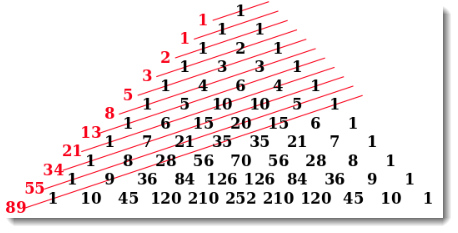Java Fibonacci examples

Fibonacci number – Every number after the first two is the sum of the two preceding.
Few Java examples to find the Fibonacci numbers.
1. Java 8 stream
1.1 In Java 8, we can use Stream.iterate to generate Fibonacci numbers like this :
Stream.iterate(new int[]{0, 1}, t -> new int[]{t[1], t[0] + t[1]})
.limit(10)
.forEach(x -> System.out.println("{" + x[0] + "," + x[1] + "}"));
Output
{0,1}
{1,1}
{1,2}
{2,3}
{3,5}
{5,8}
{8,13}
{13,21}
{21,34}
{34,55}
P.S Review the above output, the first value is what we wanted.
1.2 Final version.
Stream.iterate(new int[]{0, 1}, t -> new int[]{t[1], t[0] + t[1]})
.limit(10)
.map(t -> t[0])
.forEach(x -> System.out.println(x));
Output
13 21 34
1.3 Sum all the Fibonacci numbers
int sum = Stream.iterate(new int[]{0, 1}, t -> new int[]{t[1], t[0] + t[1]})
.limit(10)
.map(t -> t[0])
.mapToInt(Integer::intValue)
.sum();
System.out.println("Total : " + sum);
Output
Total : 88
1.4 Join with commas.
String collect = Stream.iterate(new int[]{0, 1}, t -> new int[]{t[1], t[0] + t[1]})
.limit(10)
.map(t -> t[0])
.map(String::valueOf) // convert to string
.collect(Collectors.joining(", "));
System.out.println("Result : " + collect);
Output
Result : 0, 1, 1, 2, 3, 5, 8, 13, 21, 34
1.5 A function to create a List of Fibonacci numbers.
package com.mkyong.concurrency;
import java.util.List;
import java.util.stream.Stream;
import static java.util.stream.Collectors.toList;
public class Fibonacci {
public static List<Integer> getFibonacci(int series) {
return Stream.iterate(new int[]{0, 1}, t -> new int[]{t[1], t[0] + t[1]})
.limit(series)
.map(n -> n[0])
.collect(toList());
public static void main(String[] args) {
List<Integer> fibonacci = getFibonacci(10);
fibonacci.forEach(x -> System.out.println(x));
Output
13 21 34
1.6 The type int and long are not enough to store larger Fibonacci numbers. Below is the BigInteger example to find the first million Fibonacci numbers.
package com.mkyong.concurrency;
import java.math.BigInteger;
import java.util.stream.Stream;
public class Fibonacci {
public static BigInteger getFibonacci(int series) {
return Stream.iterate(new BigInteger[]{
BigInteger.ZERO, BigInteger.ONE}, t -> new BigInteger[]{t[1], t[0].add(t[1])})
.limit(series)
.map(n -> n[1]) // find, we need n[1]
.reduce((a, b) -> b).orElse(BigInteger.ZERO);
public static void main(String[] args) {
System.out.println(Fibonacci.getFibonacci(1_000_000));
Output
1953282128707757731632014947596256332443... // 208,988 digits!!!, too long to display here
2. Recursive Loop
2.1 Java recursive loop example to create a list of Fibonacci numbers. Good to demo only, this recursive loop is slow.
package com.mkyong.concurrency;
public class Fibonacci {
public static int fib(int n) {
if (n <= 1) return n;
else return fib(n - 1) + fib(n - 2);
public static void main(String[] args) {
for (int i = 0; i < 10; i++) {
System.out.println(fib(i));
Output
13 21 34
2.2 How it works?
fib(n) = fib(n - 1) + fib(n - 2); fib(5) = fib(4) + fib(3); fib(4) = fib(3) + fib(2); fib(3) = fib(2) + fib(1); fib(2) = fib(1) + fib(0); fib(1) = 1 fib(0) = 1
3. Normal Loop
3.1 Java normal loop to find the Fibonacci numbers, simple and easy.
package com.mkyong.concurrency;
import java.math.BigInteger;
public class Fibonacci {
public static int fib(int n) {
if (n <= 1) return n;
int previous = 0, next = 1, sum;
for (int i = 2; i <= n; i++) {
sum = previous;
previous = next;
next = sum + previous;
return next;
public static BigInteger fib2(int n) {
if (n <= 1) return BigInteger.valueOf(n);
BigInteger previous = BigInteger.ZERO, next = BigInteger.ONE, sum;
for (int i = 2; i <= n; i++) {
sum = previous;
previous = next;
next = sum.add(previous);
return next;
public static void main(String[] args) {
for (int i = 0; i < 10; i++) {
System.out.println(fib(i));
System.out.println("---");
for (int i = 0; i < 10; i++) {
System.out.println(fib2(i));
System.out.println("---");
System.out.println(fib(100)); //overflow
System.out.println(fib2(100));
Output
13 21 34 --- 13 21 34 --- -980107325 354224848179261915075
Please use BigInteger to store the Fibonacci numbers to avoid an overflow issue.
References
From:一号门
Previous:Java Fork/Join Framework examples

COMMENTS